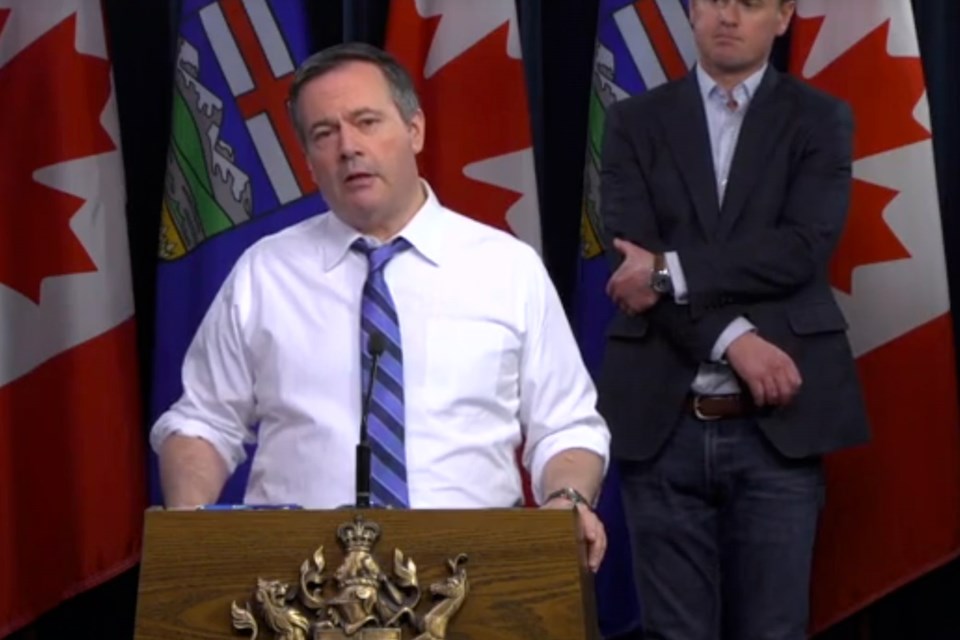Older students will be sent home from school at the end of the month, indoor social gatherings are banned and businesses will face restrictions after COVID-19 cases have surged in Alberta.
On Tuesday afternoon, Premier Jason Kenney introduced “bold and targeted new measures to protect lives and livelihoods,” which bans indoor social gatherings, ends in-person learning at the end of the month for kids in Grades 7 to 12 and places limits on some businesses.
Kenney declared a state of public emergency. On Nov. 30 all students from Grades 7 to 12 will be learning online from home for the rest of 2020. They'll return to in-person classes Jan. 11, after the winter break. Diploma exams are optional for rest of the school year – students and families can choose to write an exam or receive an exemption for the April, June and August 2021 exams.
Younger students and early childhood services will stay in schools until Dec. 18. Between Dec. 18 and Jan. 11, aside from the time they spend on their winter break, they will do at-home learning.
“These steps are not being taken lightly,” Kenney said.
“These are the minimum restrictions needed now to minimize the damage to the healthcare system.”
Indoor social gatherings are now banned across Alberta, a rule that will stay in place until further notice. Outdoor social gatherings are limited to 10 people. Funerals and weddings will be restricted to 10 people with no receptions.
“Social gatherings are the biggest problem,” Kenney said.
“(Social gatherings are) the key reason why COVID-19 is winning.”
Health Minister Tyler Shandro said breaking the rules can result in up to $1,000 for a ticket offence and $100,000 through the courts. Alberta peace officers will be able to deliver fines to anyone violating the limits.
The Alberta emergency alert system will send out a notice to all Albertans through their cell phones to ensure all residents know of these changes.
Places of Worship
All places of worship across the province will need to cap their attendance to one-third of their fire code capacity with everyone inside wearing a mask, sitting with their cohort and social distancing.
Kenney said while almost all places of worship are following the current rules around COVID-19, a select few have been not complying, resulting in outbreaks. The premier said most have worked hard to limit the spread and recognizes these institutions are vital part of peoples emotion, mental and spiritual health.
These new rules will be in place for three weeks.
Business restrictions
Many businesses will now be either closed for in-person shopping, open with restricted capacity or open by appointment only.
Banquet halls, conference centres, trade shows, concert venues, non-approved/licenced markets and community centres are closed. Children's play places, indoor playgrounds and all levels of sport (professional, semi-professional, junior, collegiate/universities and amateur) are also banned from in-person activities. Sports leagues may apply for exemptions.
Kenney said while many are following the rules, there have been nine outbreaks traced back to amateur hockey games in the province.
Most retail businesses may remain open with capacity limited to 25 per cent of the occupancy set under the Alberta Fire Code, including retail stores, grocery stores, pharmacies, clothing stores, computer and technology stores, hardware, automotive, farmers markets and outdoor seasonal markets. Some entertainment services fall under the 25 per cent threshold as well, like movie theatres, museums, libraries, casinos, indoor entertainment centres, indoor fitness, recreation sports and physical activity centres, including dance and yoga studios, martial arts, gymnastics and private or public swimming pools.
Other businesses open by appointment only are not permitted to offer walk-in services. Appointments should be limited to one-on-one services. These businesses include personal services such as hair salons and barbershops, esthetics, manicure, pedicure, body waxing and make-up, piercing and tattoo services; wellness services including acupuncture, massage and reflexology; professional services such as lawyers, mediators, accountants and photographers; private one-on-one lessons (no private group lessons permitted); hotels, motels, hunting and fishing lodges.
Bars and restaurants can continue in-person dining but must comply with guidelines and those seated at tables together must be part of same household.
Masks
Masks are now mandatory inside all workplaces Edmonton, Calgary and their surrounding areas. The premier said much of the COVID-19 spread is happening inside workplaces.
A full list of public health measures can be found on Alberta's website.
Tuesday's stats
On Tuesday, Alberta reported an additional 1,115 cases of COVID-19. That's lower than the past few days, but Alberta Chief Medical Officer of Health Dr. Deena Hinshaw said that was because there were fewer tests, some 13,500, with a provincial positivity rate of 8.3 per cent. Sixteen deaths were announced on Tuesday from COVID-19, and over the past two weeks 103 people died from the virus.
There are currently 348 hospitalizations with 66 people in ICU. The province has lost 492 residents in total to COVID-19. The average age of death is 82 years.
There are currently 13,349 active cases in the province, the most in the country, with the bulk of them being in the Edmonton (6,128 cases) zone.
The premier said continuing care cases have quadrupled since Oct. 1.
“My heart goes out to their loved ones and all those grieving."



